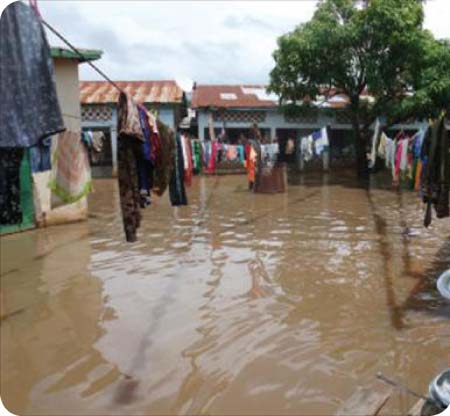By Isatou Fofana
The July 30 and 31 heavy rains that directly affected at least 40,000 people, 13,000 households, including more than 8,000 children under the age of five, have been recorded as the highest for the last 34 years. The affected areas include the capital Banjul, the Kanifing Municipality, West Coast Region and some parts of the North Bank Region. Communities have been left isolated after roads were cut and many people stranded, helpless and vulnerable.
As well as the victims, the country’s disaster management agency, together with stakeholders like the Red Cross, has been battling with the aftermath of the rain havoc, assessing the impact and assisting victims with food and shelter, as well as with drainage of the inundations.
The National Disaster Management Agency (NDMA) has gotten a major boost with the arrival of an assessment team from the UN Office of Humanitarian Affairs (OCHA), who is currently in the country to support the operations related to the July floods. The mission will be in the country for three weeks to support the development and coordination of international response system on disaster, emergency coordination, preparedness, and public health.
On receiving the delegation, the Executive Director, National Disaster Management Agency, Mr Sanna Dahaba, expressed gratitude to the UN coordinating team for their swift response to the Agency’s call to provide technical support. He also expressed hope that the team’s intervention will help strengthen the response capacity to climate disasters.
The assessment, he said is very essential as it will bring up to date information to the government on various strategies and policy decisions during implementation.
Angus Lambkin, Head of Mission, Office of Humanitarian Affairs affirmed that the aim of their visit is to provide technical assistance and funding to the disaster victims, while encouraging relevant actors to collaborate in disaster risk reduction.
The Resident Coordinator World Food Programme (WFP) and UN Disaster Risk Group chairman Yashuhiro Tsamura assured that the United Nations office in The Gambia is here to support and complement government’s efforts in combating climate-related issues in the country.
“The United Nations has approved an emergency response fund of one million dollars for food assistance and other sanitary materials for disaster victims in the country”.
According to the Department of Water Resources, rainfall quantity recorded on the 30th and 31st of July was 276mm at Banjul International Airport in Yundum. The last time this happen was in 1998 where 175.4mm was recorded. Historically, The Gambia has been experiencing flooding since 1948. The frequency and magnitude has increased over the years thereby impacting negatively on the lives and livelihoods of the population.
Consequently 43,984 people have been affected across the country. KMC has the most affected people with 17,729. Data also shows that 5,986 people have been internally displaced and 7 fatalities from the flashfloods. Considering this, the government of The Gambia in consultation with the UN Resident Coordinator’s office requested for technical support with assessment, analysis, information management, mapping and coordination.






